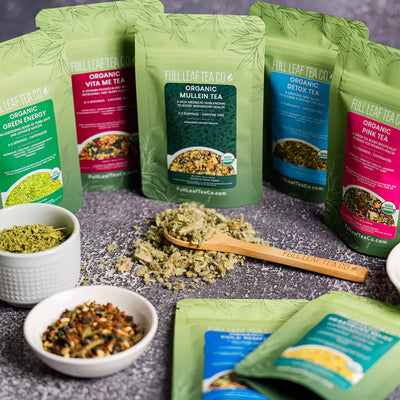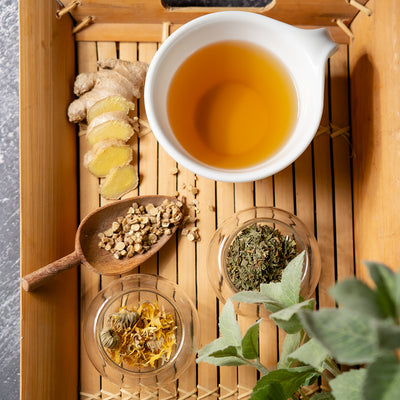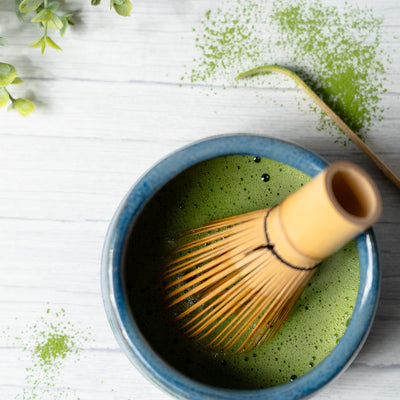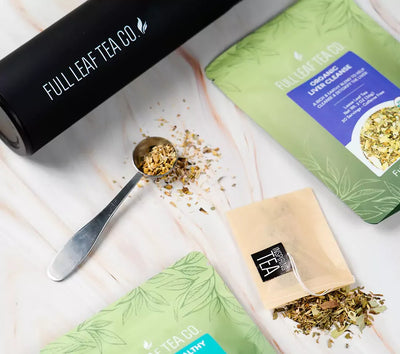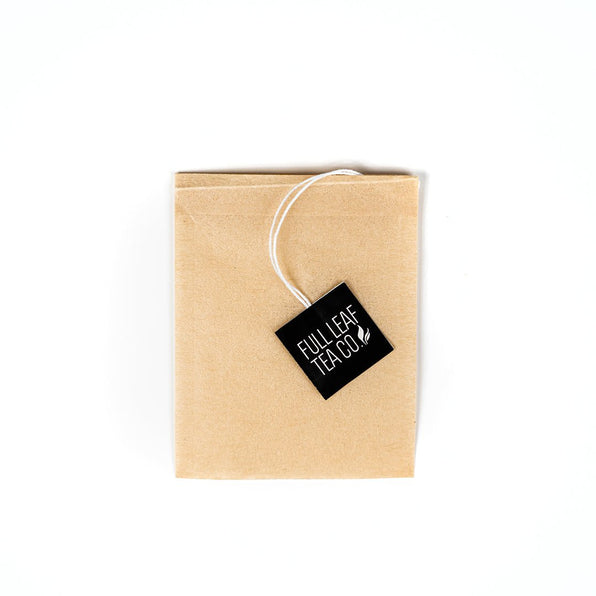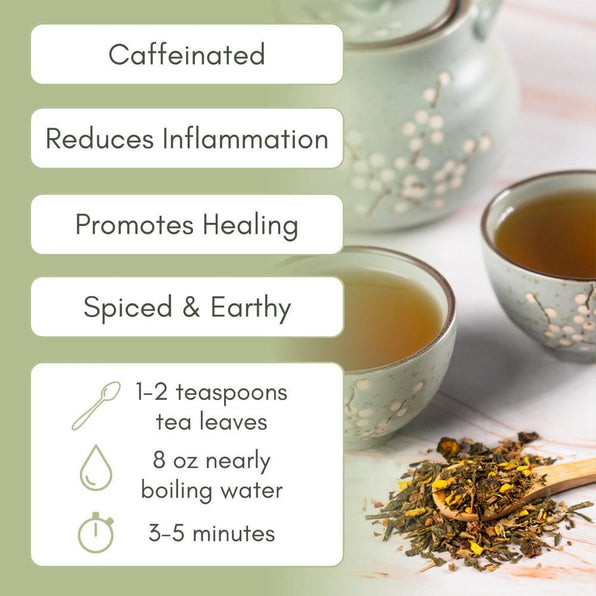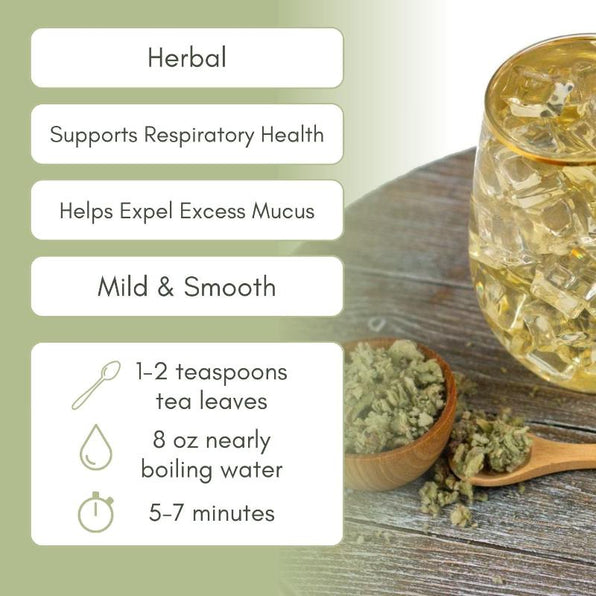When you find yourself battling the discomfort of a cold or flu, turning to nature's remedies can feel like a comforting and holistic approach to healing. Among the countless herbs available, there are five remarkable ones that have personally stood the test of time for their ability to provide relief and bolster the immune system.
Mullein's gentle touch on respiratory congestion has offered us much-needed relief during stuffy nights. The zesty lemon peel, brimming with vitamin C, has been a trusted companion in our quest for immune support. Echinacea's immune-boosting prowess never fails to make us feel stronger and more resilient and the spicy warmth of ginger, with its anti-inflammatory and digestive benefits, has been our source of comfort during bouts of nausea and discomfort. Elderberries are brimming with health benefits and add a boost of antioxidants to your body, helping it heal faster from illness and preventing further infection.
Together, these herbs have become our personal allies in the fight against colds and flu, providing solace and promoting a speedier recovery. However, it's essential to remember that individual health needs vary, and before incorporating new herbs into your diet, it's advisable to consult with a healthcare professional.

1.
Echinacea
Echinacea, commonly known as the purple coneflower, has a rich history as a medicinal herb, particularly among the indigenous tribes of North America.
Native Americans have used echinacea for centuries before European settlers arrived, utilizing it for a variety of ailments including wound healing, infections, and as an immune system booster.
The use of echinacea as a medicinal plant was widely adopted by European settlers in America and became a staple in folk medicine. Its popularity surged in the 18th and 19th centuries, especially as a treatment for conditions like colds, flu, and other infections.
Although its use declined with the advent of antibiotics in the 20th century, interest in echinacea resurfaced towards the end of the century, especially in the realms of alternative and complementary medicine, as people began to seek natural remedies for health maintenance and the treatment of various conditions.
What Have Studies on Echinacea Shown?
Studies on echinacea, an herb widely used for its immune-boosting properties, have produced mixed results. Research predominantly focuses on its effectiveness in reducing the severity and duration of cold symptoms.
Some studies suggest that echinacea can stimulate the immune system, potentially making it more efficient in combating cold viruses, due to its bioactive compounds like alkamides. However, the outcomes vary significantly, with some research indicating noticeable benefits, while others show minimal impact.
This inconsistency is often attributed to the different species of echinacea used, the parts of the plant processed, and the methods of extraction. The herb's antioxidant properties have also been explored, suggesting potential broader health benefits.
Despite these findings, the scientific community remains divided on the extent of echinacea's efficacy, highlighting the need for more comprehensive, standardized research to fully understand its role in health and disease management (1).

2.
Elderberry
Elderberries, from the Sambucus tree, have a rich history that intertwines with various cultures and medicinal traditions across the globe. Their use dates back to prehistoric times, with evidence suggesting their consumption by ancient Egyptians and indigenous tribes of North America.
In European folklore, the elder tree was revered, often associated with protection and healing; parts of the tree, especially the berries, were used in traditional medicines.
The berries were also popular in ancient Roman and Greek cultures, where they were valued both for their culinary and medicinal properties. Throughout history, elderberries have been used to treat a wide range of ailments, from colds and flu to inflammation and pain.
This deep historical use has carried into modern times, where elderberries are still celebrated for their health benefits and incorporated into various dietary supplements and natural remedies.
What Have Studies on Elderberries Shown?
Elderberry, scientifically known as Sambucus nigra, has been the subject of numerous studies due to its potential health benefits, especially in the treatment of colds and flu. Research has shown that elderberry extracts have significant antiviral properties, which can help combat viruses like influenza.
A notable study published in the Journal of International Medical Research found that elderberry syrup significantly reduced the duration and severity of flu symptoms when taken within 48 hours of the onset.
Other studies have highlighted its immune-boosting effects, rich in antioxidants and vitamins that can help strengthen the body's natural defenses. Additionally, elderberry has been found to have anti-inflammatory properties, which can be beneficial in reducing the symptoms of sinus infections and other respiratory issues.
While these findings are promising, experts recommend more extensive research to fully understand the scope of elderberry's effectiveness and to establish standardized dosages and preparations for maximum benefit. (2)

3.
Ginger
Ginger root, known scientifically as Zingiber officinale, has a rich and storied history that spans thousands of years and multiple continents.
Its origins trace back to Southeast Asia, and it has been used both as a culinary spice and a medicinal herb since ancient times.
Ginger was highly prized in the trade routes of the ancient world, finding its way into the Roman Empire by the first century AD and later spreading throughout Europe during the Middle Ages. It was so valued that, at one point, a pound of ginger was equivalent to the cost of a sheep!
In traditional medicine, particularly in Ayurveda and Chinese medicinal practices, ginger has been used for a myriad of health issues, ranging from digestive problems to inflammation.
The versatility and distinct flavor of ginger have cemented its place in a wide array of culinary traditions around the world, making it a globally recognized and cherished root.
What Have Studies on Ginger Shown?
Studies have shown that ginger, a versatile spice and medicinal herb, offers a range of potential health benefits. It is renowned for its anti-inflammatory and antioxidant properties, which can help alleviate various forms of discomfort, including nausea, muscle pain, and joint pain.
Ginger has been extensively studied for its efficacy in reducing nausea and vomiting, particularly during pregnancy, chemotherapy, and postoperative recovery.
Additionally, it may aid in digestion by promoting gastric emptying and reducing gastrointestinal irritation. Some research also suggests that ginger may help lower blood sugar levels and have a modest effect on reducing blood pressure.
While ginger can be a valuable addition to a balanced diet, it's essential to consume it in moderation and consult with a healthcare provider, especially if you have underlying medical conditions or are taking medications, to ensure its safe and appropriate use. (3)

4.
Mullein
Mullein, scientifically known as Verbascum thapsus, has a rich history dating back centuries and has been valued for its various medicinal and practical uses.
Native to Europe and Asia, it was introduced to North America by early European settlers. In ancient times, mullein was recognized by cultures such as the Greeks and Romans for its therapeutic properties, particularly for treating respiratory ailments like coughs and bronchitis.
The soft, fuzzy leaves of the mullein plant were used as an insulating material and wick for lamps in Europe, earning it the nickname "torches" plant. Native American tribes also utilized mullein for its medicinal benefits, employing it as a poultice, tea, or smoking herb.
Throughout history, mullein has maintained its reputation as a versatile herb, appreciated for its soothing effects on the respiratory system and its historical significance as both a medicine and a practical resource.
What Have Studies on Mullein Shown?
Studies on mullein, while limited compared to some other herbs, have shown promising results regarding its potential health benefits. Mullein has been investigated for its effectiveness in addressing respiratory issues, such as coughs, bronchitis, and asthma.
Research suggests that mullein's anti-inflammatory and soothing properties may help reduce irritation and alleviate respiratory symptoms. Some studies have also explored its antimicrobial properties, which could potentially contribute to its ability to combat respiratory infections.
Additionally, mullein has been examined for its analgesic effects and may help alleviate pain and discomfort associated with conditions like earaches.
While these findings are promising, more research is needed to fully understand the mechanisms and broader applications of mullein's therapeutic properties. As with any herbal remedy, it's advisable to consult with a healthcare professional before using mullein for specific health concerns. (4)

5.
Lemon Peel
Lemon peel, the vibrant and aromatic outer skin of the lemon, has a rich history of use that spans various cultures and centuries. Historically, its origins trace back to ancient times when it was highly prized in regions like the Middle East, Asia, and the Mediterranean for its culinary, medicinal, and even cosmetic applications.
The peel, known for its high concentration of essential oils and potent flavor, was used to add zest and brightness to foods and as a natural preservative. In traditional medicine, it was valued for its digestive, antibacterial, and antiviral properties.
Lemon peel was also used in early forms of aromatherapy and as a natural cleaning agent due to its refreshing scent and antibacterial qualities. Over time, its use spread globally, becoming a staple in many kitchens and an integral part of various herbal remedies, showcasing its versatility and enduring appeal.
What Have Studies on Lemon Peel Shown?
Studies on lemon peel have unveiled a host of potential health benefits largely attributed to its rich composition of nutrients and bioactive compounds. Rich in vitamin C, flavonoids, and essential oils, lemon peel has demonstrated antioxidant and antimicrobial properties in various research settings.
These antioxidants, particularly flavonoids like hesperidin and d-limonene, are thought to play a crucial role in combating oxidative stress, a factor implicated in chronic diseases such as heart disease and certain cancers.
Additionally, research in from PubMed highlighted the potential of lemon peel in lowering blood cholesterol levels, which is significant for cardiovascular health. The antimicrobial properties of lemon peel make it effective against a range of bacterial and fungal infections, as shown in several studies.
However, while the existing research points to promising health benefits, scientists continue to emphasize the need for further studies to fully understand the extent of lemon peel's health-promoting properties and its practical applications in diet and medicine. (5)
Here Are Our Sources!
1.Link, Rachael. “Echinacea: Benefits, Uses, Side Effects and Dosage.” Healthline, Healthline Media, 3 June 2017, www.healthline.com/nutrition/echinacea-for-colds.
2. Link, Rachael. “Elderberry: Benefits and Dangers.” Healthline, Healthline Media, 29 Jan. 2019, www.healthline.com/nutrition/elderberry
3. Ware, Megan. “11 Proven Health Benefits of Ginger.” Healthline, Healthline Media, 11 June 2017, www.healthline.com/nutrition/11-proven-benefits-of-ginger.
4. Powers, Daniel MS. "Mullein: 5 Key Benefits, Dosage, & Safety." The Botanical Institute, 12 Dec. 2022, botanicalinstitute.org/mullein
5.Bok, Shin Hia, et al. “The Hypocholesterolemic Effect of Lemon Peels, Lemon Pectin, and the Waste Stream Material of Lemon Peels in Hybrid F1B Hamsters.” PubMed, 1 Mar. 2002, pubmed.ncbi.nlm.nih.gov/11990004/.
6. Watson, Kathryn. “12 Natural and Home Remedies for the Common Cold.” Healthline, Healthline Media, 25 Oct. 2017, www.healthline.com/health/cold-flu/home-remedies#faq.

